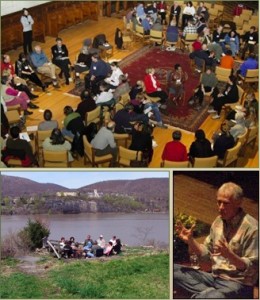While the environmental movement is nothing new, dating back almost a century, the approach of activists, organizations and policy makers is continuously evolving. The Garrison Institute is taking measures to contribute to this evolution by creating the Climate, Mind, and Behavior Program. The CMB program looks to combine a number fields to solve environmental issues.
The Garrison Institute holds a CMB Symposium where leading scientists and thinkers from the fields of environmental advocacy, neuro-economics, behavioral and evolutionary economics, psychology, social networking, policy-making, investing and social media together to focus on new approaches to reducing emissions on a large scale. The event has been held in March annually since 2010.
The program approach is to use recent developments in understanding human behavior and human nature combined with the fields of psychology, evolutionary theory and apply it to environmental and climate change issues. The goal is to come out with new tactics to tackling environmental issues across the board, from reducing emissions to clean water, and everything in between.
Another important aspect of the CMB program, in conjunction with the Natural Resource Defense Council (NRDC), is the envisioned “behavioral wedge.” A goal for individuals to make simple behavioral changes to eliminate a giga-ton of greenhouse gas emissions. The “behavioral wedge” looks to make an early difference because regulatory changes, investment, research, and other new approaches take some time to implement. This CMB/NRDC research hopes to provide for progress to be made during the lull as other initiatives from the CMB program take shape.
By aligning climate change solutions with the way people think and behave, the Garrison Institute looks to produce much more effective and efficient solutions to solve our environmental problems. To track progress, The Garrison Institute’s website keeps a blog for updates on the CMB program, as well as a wealth of other resources and information related to the project.

